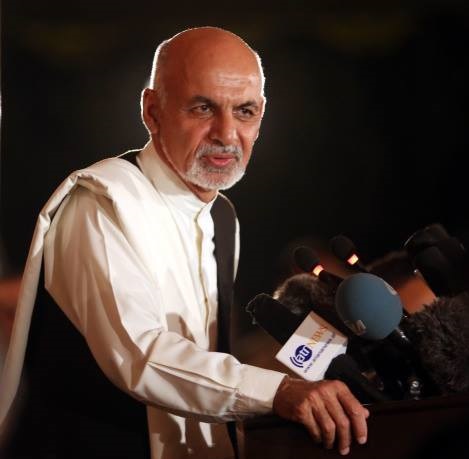Afghanistan’s election recount is over, but no one knows anything about the extent of the vote totals.![]()
That’s because Ashraf Ghani Ahmadzai, a former UN official and former finance minister, was summarily declared the winner only after agreeing a power-sharing deal with challenger Abdullah Abdullah, a former foreign minister and the runner-up to Hamid Karzai in the fraud-riddled presidential election of 2009. Afghanistan’s election commission didn’t even release the purported election results, in part because after three months of post-election limbo, we might not ever know who really won the June 14 runoff.
Ghani will be sworn in as president within the next two weeks, and Abdullah will serve as ‘chief executive officer’ in the new government.
If that sounds vague, it’s because it is.
Ghani and Abdullah appeared with Karzai in Kabul earlier today, but they didn’t address the nature of the new government, or what might happen if Ghani and Abdullah have differences about where the president’s power ends and the ‘chief executive officer’s’ powers begin.
The deal will make Abdullah the country’s de facto prime minister. Ghani will control the Afghan military, whatever that’s worth, but Ghani and Abdullah are supposed to make joint decisions, with shared powers to appoint officials, something that invite graft and gridlock in equal measure.
It’s a short-term victory for the United States, and US secretary of state John Kerry tried to broker a deal shortly after the June runoff election, when it became increasingly clear that fraud would cloud the results. Karzai rebuffed US efforts to negotiate a post-occupation security agreement that could retain some US presence after the vast majority of US and NATO military forces leave the country. Both Ghani and Abdullah, however, indicated their strong support for a residual US peacekeeping role in 2015 and beyond. The bilateral agreement will be the first major business of the new Ghani administration, though US president Barack Obama has indicated that he wants no more than 10,000 remaining troops in Afghanistan after 2016.
* * * * *
RELATED: Afghanistan hopes for calm as key presidential election approaches
RELATED: Is Ghani’s Afghan preliminary electoral victory a fraud?
RELATED: Afghanistan’s election becomes a farce —
and a US policy disaster
* * * * *
In the long-term, the deal couldn’t be a more devastating statement about the failure of the United States, after a 13-year role in Afghanistan, to build and support credible national institutions. There’s absolutely no legal or constitutional authority in Afghanistan for the kind of deal that Kerry has pursued.
Karzai, who is not permitted to run for reelection, pushed both candidates to a deal, and he tried to schedule an inauguration for September 2 in an attempt to pressure Ghani and Abdullah into cooperation. Throughout the summer and autumn, Abdullah has routinely pulled out of the audit and negotiation proceedings. There’s a not insignificant risk that Abdullah will reject the deal in the future and leave Ghani’s government if, fairly or unfairly, he believes Ghani isn’t respecting the spirit of true power-sharing.
If Ghani fails, he will risk exacerbating ethnic tensions among the Tajik minority that dominates northeastern Afghanistan, including the capital, Kabul. That, ultimately, could distract Ghani from the more important task of reaching a political settlement with the Taliban-led insurgency that has continued to wreak havoc throughout Afghanistan during its sprawling election crisis. The Tajik-dominated Northern Alliance was a crucial partner in the US campaign to push the Taliban from power in late 2001, and a united front could give the Ghani government enough credibility to force negotiations from a position of strength.
If Ghani and Abdullah succeed in calming the insurgency, it will give Afghanistan the breathing space to bolster the rule of law and other national institutions that are today, quite obviously inadequate. At a minimum, the Ghani administration will almost certainly have to revisit provisions of the Afghan constitution in light of the fact that its government has no authentic constitutional basis.
Abdullah convincingly won the initial first-round vote on April 5, falling just 5% short of an outright victory, and he subsequently won the support of Zalmai Rassoul, the third-place candidate who had the unofficial support of the outgoing Karzai administration. Nevertheless, preliminary results in the June 14 runoff gave Ghani a lead. The post-runoff crisis was a shock in light of the relatively smooth first round, during which Taliban-led violence kept to a minimum.
It’s not unexpected that, in a direct race against Abdullah, who is half-Tajik, half-Pashtun, and more associated with Tajik political leaders, Pashtun voters would rally behind Ghani (whose running mate Abdul Rashid Dostum is a leading Uzbek warlord who helped Ghani win support from Afghanistan’s third-largest ethnic group). Pashtuns constitute the largest ethnic group, by far, in Afghanistan — only once in the past century has Afghanistan had a Tajik leader, Burhanuddin Rabbani, who barely governed the country during its post-Soviet civil war between 1992 and 1996.
Nevertheless, Abdullah’s allegations of fraud are generally credible, just as in the 2009 election, and both campaigns agreed to a UN-monitored audit of the voting, though it’s not clear that the audit has determined the extent of the fraud. That Afghanistan’s election commission didn’t even bother revealing the final, audited count underlines the flawed voting process.
It’s a fair bet that the Ghani administration will conclude a security agreement with the United States in short order, but maintaining a united government, ending the Taliban insurgency and rebuilding Afghanistan’s troubled economy will prove far harder.
